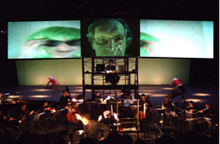An “Imaginary” Opera
CFA professor uses technology to re-create Lolita

Opera, in the traditional sense, is a sprawling musical ensemble, filled with sweeping lyrical passages, romantic plots, lavish costumes, and stunning sets. But Joshua Fineberg’s multimedia adaptation of Vladimir Nabokov’s notorious Lolita is anything but traditional. Using advanced computer technology, the College of Fine Arts visiting associate professor of music has created a sparse “imaginary opera that captures the thoughts of a madman.”
Lolita tells the story of Humbert Humbert, a British man who falls in love with his American landlady’s 12-year-old daughter. First published in France in 1955, the controversial novel was critically acclaimed and has since achieved cult-classic status. It has been adapted into two films and numerous stage productions.
Based entirely on Humbert’s inner monologue, Fineberg’s revision of the novel focuses less on plot and more on the protagonist’s precarious mental state. “Humbert is the only thing that’s real,” Fineberg explains. “The other characters — Lolita, Charlotte, Clare Quilty — exist only in his head. And the various voices we hear — they’re actually only Humbert’s voice coming through the bodies he’s imagining.”
In order to achieve this disorienting effect, Fineberg teamed up with the Paris-based IRCAM (Institut de Recherche et Coordination Acoustique/Musique) to develop an innovative voice modification technology. Together, they created a software program that separates the actor’s prerecorded voice into two components: a “source,” or the sound produced by the voicebox, and a “filter,” the resonation in the sinus cavity. The two components are used to create a variety of different voices, each imagined by Humbert. The software stretches and transposes Humbert’s voice to make it more songlike.
Humbert speaks nearly continuously throughout the entire 70-minute production while prerecorded music and a 10-piece orchestra play in the background, creating a multilayered effect that mirrors a disturbing inner conflict. “Although Humbert is speaking to the audience in a clear, rational voice, his own mind is constantly undermining him,” Fineberg says. “And the audience is experiencing this subjective world. We’re in Humbert’s head and he’s in ours, manipulating us. When you walk into the theater, you’re immediately in Humbert’s world.”
The production premiered last April in Marseille and received critical praise from the French press. “The show was oversold, and people were actually sitting in the aisles,” Fineberg says. It will continue to tour Europe throughout the fall, making its U.S. debut on April 2, 2009, at the Peak Performances series at Montclair State University in New Jersey.
One of the challenges of composing in opera is making it natural for the characters to begin singing. However, Fineberg says, in Lolita, the audience easily accepts the music because it is an internal monologue, not a real-life dialogue. “There’s an incredibly lyrical voice, but it’s all in Humbert’s head,” he says. “Every life is contained within Humbert’s life, so there’s no reality beyond Humbert’s life.”
Click here to listen to an excerpt from "Lolita."
Vicky Waltz can be reached at vwaltz@bu.edu.
Comments & Discussion
Boston University moderates comments to facilitate an informed, substantive, civil conversation. Abusive, profane, self-promotional, misleading, incoherent or off-topic comments will be rejected. Moderators are staffed during regular business hours (EST) and can only accept comments written in English. Statistics or facts must include a citation or a link to the citation.